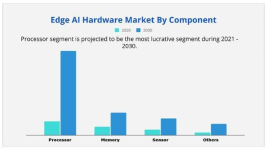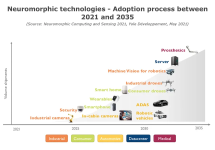You are using an out of date browser. It may not display this or other websites correctly.
You should upgrade or use an alternative browser.
You should upgrade or use an alternative browser.
BRN Discussion Ongoing
- Thread starter TechGirl
- Start date
Yes, Some customers reviewing Akida 1 did put their research on hold to wait for Akida 2. I imagine they would have been pretty unhappy if they found out about Akida 2 shortly after they started making Akida 1.What’s your thoughts as to whether customers are going to wait for the 2.0 hardware development kits to to trial and prototype before signing licenses?
Have they even been tapped out?
However, there will probably be a number of customers for whom Akida 1 is more than adequate. There will be a pricing differential for the added functionality of Akida 2.
We know Renesas taped out several months ago, and we know that MegaChips was involved in the "back end" design of Akida 1500. The rest is silence.
Bravo
Meow Meow 🐾
An interesting development as U.S. lawmakers are pushing to limit American corporate engagement with open-source chip technology RISC-V, alleging that it aids Beijing’s semiconductor goals and could potentially compromise US national security.
Good news for Arm but bad news for Qualcomm I guess, considering they're working heavily with RISC-V chips.
but bad news for Qualcomm I guess, considering they're working heavily with RISC-V chips.
Good news for Arm
Shadow59
Regular
Also bad news for SiFiveAn interesting development as U.S. lawmakers are pushing to limit American corporate engagement with open-source chip technology RISC-V, alleging that it aids Beijing’s semiconductor goals and could potentially compromise US national security.
Good news for Armbut bad news for Qualcomm I guess, considering they're working heavily with RISC-V chips.
rgupta
Regular
And can be bad news for us as well. As we work closely with Sifive.An interesting development as U.S. lawmakers are pushing to limit American corporate engagement with open-source chip technology RISC-V, alleging that it aids Beijing’s semiconductor goals and could potentially compromise US national security.
Good news for Armbut bad news for Qualcomm I guess, considering they're working heavily with RISC-V chips.
rgupta
Regular
How they will stop arm either? Arm have a full fledged presence in china.An interesting development as U.S. lawmakers are pushing to limit American corporate engagement with open-source chip technology RISC-V, alleging that it aids Beijing’s semiconductor goals and could potentially compromise US national security.
Good news for Armbut bad news for Qualcomm I guess, considering they're working heavily with RISC-V chips.
Bravo
Meow Meow 🐾
Will be interesting to see how this pans out as some reports suggest that crackdowns and restrictions are doomed to fail.Also bad news for SiFive
rgupta
Regular
Does it mean that the tussel is going on for quite a time now. That is why LDN openly claimed we will not need Chinese money for brn developments.An interesting development as U.S. lawmakers are pushing to limit American corporate engagement with open-source chip technology RISC-V, alleging that it aids Beijing’s semiconductor goals and could potentially compromise US national security.
Good news for Armbut bad news for Qualcomm I guess, considering they're working heavily with RISC-V chips.
I assume brainchip is well aware of those developments and should be benefitted by hiding themselves from Chinese money.
But ... but ... but, ARM ha(s/d) a major presence in China ... !!!???An interesting development as U.S. lawmakers are pushing to limit American corporate engagement with open-source chip technology RISC-V, alleging that it aids Beijing’s semiconductor goals and could potentially compromise US national security.
Good news for Armbut bad news for Qualcomm I guess, considering they're working heavily with RISC-V chips.
Bravo
Meow Meow 🐾
I suppose that's why they beefed up the IPO filing’s 330-page prospectus. Chinese market accounts for about a quarter of Arm's revenue.But ... but ... but, ARM ha(s/d) a major presence in China ... !!!???
Fullmoonfever
Top 20
Would need to check but I'm not sure SiFive architecture etc is open source.And can be bad news for us as well. As we work closely with Sifive.
Some of their software, tools, specs etc might be.
So, could be ok for them and us if they tied into the US and allies plus have the difference of being more secure in some aspects?
Tothemoon24
Top 20
Silicon Valley Sees a New Kind of Mobile Device Powered by AI — Bloomberg Businessweek
Silicon Valley is bettin that ChatGPT and other generative AI tools will point the way to a smartphone successor. But first …
A day later, there was another signal that Big Tech is ready to build devices around generative AI. Several publications reported that OpenAI, the company behind ChatGPT, is engaged in talks with LoveFrom, the industrial design firm founded by former Apple Inc. hardware wizard Jony Ive, about creating a venture to build “the iPhone of artificial intelligence.” There were few details, other than that Masayoshi Son, the chairman and chief executive officer of SoftBank Group Corp., is ready to invest $1 billion into the venture and that Ive is demoralized by the addictive elements of smartphones and wants to use AI to find an alternative.
equanimous
Norse clairvoyant shapeshifter goddess
Dhm
Regular
I would imagine there are many companies who's products only need Akida 1. Like Fridge companies using the olfactory sensors (the meat/milk/last weeks dinner is off) and doorbell companies, non high tech drones, facial recognition, fatigue recognition, less sophisticated robotic situations, cost and wattage effective CCTV, smoke alarms and hundreds of similar functions that are in need of vast improvement compared to current standards.Yes, Some customers reviewing Akida 1 did put their research on hold to wait for Akida 2. I imagine they would have been pretty unhappy if they found out about Akida 2 shortly after they started making Akida 1.
However, there will probably be a number of customers for whom Akida 1 is more than adequate. There will be a pricing differential for the added functionality of Akida 2.
We know Renesas taped out several months ago, and we know that MegaChips was involved in the "back end" design of Akida 1500. The rest is silence.
No worries Papa. Hope Mama is doing well.
I take your point, which is why I included that rousing clip which puts a lump in my throat and brings a tear to my eye still, after all these many years and even though I know its from a movie and is engineered to manipulate my emotions...............
We are merely human and have buttons that can be pushed.
I get that.
I just think that even if Sean or Antonio or even PVDM got on the horn and delivered as effective a speech as that, without any credible corroborating news of substance to back it up, then, the next day or the next week when the share price slips another couple of cents we are in an even worse position because managements authority will have been further eroded.
If they had anything of substance beyond what has already been released, they would have done so already.
The situation has not actually fundamentally changed.
It still looks promising from their end.
More and more potential customers are evaluating our offering.
More and more partners, associates and colleagues are joining our, or inviting us to join their, eco-systems.
Stuff is happening.
It's just taking longer than any of us, including our board and management, would like, to tick over that point where it becomes visible to those outside the deal room.
We here are luckier than most in that we get to see hints of just what may be around the corner and have the support of other like minded BRNiacs.
But we certainly are being tested and it is not surprising that some are reaching their limit.
I don't picture Sean or any of the crew cowering in any ivory tower.
Having met some of them, my impression is of driven professionals executing a plan, writ with the benefit of previous successful experience, guiding our company in uncertain and definitely choppy waters.
But, like any of us, subject to the whims of others and operating in a competitive environment where not everything is within their ultimate control.
And also like us, without the benefit of hindsight, beforehand.
It just takes as long as it takes.
And we just have to suck it up.
Like people have had to, all throughout history.
Heat post
Frank Zappa
Regular
Makes perfect sense
View attachment 46573
View attachment 46574
View attachment 46576
View attachment 46580
View attachment 46582
View attachment 46583
Interesting this last slide notes that partnerships remain key due to rising complexity.
Ian
Founding Member
Speak for yourself only.Tapped out is how shareholders feel...
HopalongPetrovski
I'm Spartacus!
Wrap in tinfoil and bake on the centre shelf at 180 degrees for 35 minutes, turning once mid way through.Heat post
Remove from oven.
Pierce tinfoil and flesh with a three pronged fork and if the liquid runoff is clear your meal is ready to eat.
If still some red colouration evident return to oven for another five minutes.
Caution.....filling will be hot.
Top with fava beans, cognac braised carrots and serve with a fine chianti.
Enjoy.
Fullmoonfever
Top 20
Was just doing a random word search & noticed this result pop up.
Wasn't sure what this is but looked like some sort of word listing or frequencies of words.
Saw in the "about this result" web link it appears related to course materials of a N C Rowe at the NPS.
Quick search reveals he is a Prof there in computer science.
Apols for more weird dots




Wasn't sure what this is but looked like some sort of word listing or frequencies of words.
Saw in the "about this result" web link it appears related to course materials of a N C Rowe at the NPS.
Quick search reveals he is a Prof there in computer science.
Apols for more weird dots
Similar threads
- Replies
- 0
- Views
- 4K
- Replies
- 9
- Views
- 6K
- Replies
- 0
- Views
- 3K


